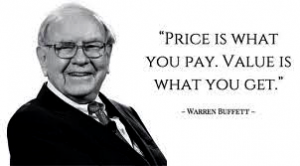It is true, talent is never enough, but that does not give us an excuse to not work hard at what we do, even when it comes to finding talent! Yet it has been proven time and time again companies and sports select individuals based upon perceived versus documented talent.
How often have we missed the right person for the right opportunity because we waste an enormous amount of time identifying all the reasons why they are not a good fit for the position or our image of the person…is actually wrong.
- The graduate from Harvard is better than the employee who graduated from a public school…let’s say, Nebraska?
Warren Buffett, the billionaire from Nebraska might argue differently. The Oracle from Omaha, as he is nicknamed, graduated from the University of Nebraska and has done quite well.
In sports, the Scouts take a simpler decision making approach. Their preconceived image states…size matters when selecting who to draft.
- Certainly the 6’4″ athlete is better than the one who is 5’6″?
5’6″ Jose Altuve, the 2019 ALCS MVP from the Houston Astros’ was told he was too small.
As Hiring Managers, Recruiters, and/or MLB Scouts we need to change our thinking patterns. Rather than wasting time identifying why we should not hire or draft a player, let’s spend more time and effort into the evaluation process. Eliminating preconceived conclusions and seeking the right person with the right talent for the job!
Let’s form our conclusions based upon my paraphrasing of John C. Maxwell’s 13 Supportive Traits he identified in his book, “Talent is Never Enough.”
- Belief lifts your talent – Do they believe?
- Passion energizes your talent – Do they have Passion?
- Initiative activates your talent – Do they have Initiative?
- Focus directs your talent – Are they focused?
- Preparation positions your talent – Are they prepared?
- Practice sharpens your talent – Can they perform?
- Perseverance sustains your talent – Do they have perseverance?
- Courage tests your talent – Are they a self-starter?
- Teach-ability expands your talent – Are they coach-able?
- Character protects your talent – Are they ethical?
- Relationships influence your talent – What do references say?
- Responsibility strengthens your talent – Are they responsible?
- Teamwork multiplies your talent – Do they collaborate?
As I started, talent is never enough, but as Benjamin Franklin said, “wise [people] profit by the mistakes of others, while fools will not learn even from their own blunders.”
Until Next Blog avoid preconceived conclusions and seek to find the best.
Al McCormick



